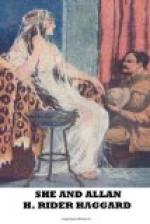During the meal and afterwards while we smoked upon the veranda, I told them as much as I thought desirable of my plans. I said that I was engaged upon a journey of exploration of the country beyond the Zambesi, and that having heard of this settlement, which, by the way, was called Strathmuir, as I gathered after a place in far away Scotland where the Captain had been born and passed his childhood, I had come here to inquire as to how to cross the great river, and about other things.
The Captain was interested, especially when I informed him that I was that same “Hunter Quatermain” of whom he had heard in past years, but he told me that it would be impossible to take the waggon down into the low bush-veld which we could see beneath us, as there all the oxen would die of the bite of the tsetse fly. I answered that I was aware of this and proposed to try to make an arrangement to leave it in his charge till I returned.
“That might be managed, Mr. Quatermain,” he answered. “But, man, will you ever return? They say there are queer folk living on the other side of the Zambesi, savage men who are cannibals, Amahagger I think they call them. It was they who in past years cleaned out all this country, except a few river tribes who live in floating huts or on islands among the reeds, and that’s why it is so empty. But this happened long ago, much before my time, and I don’t suppose they will ever cross the river again.”
“If I might ask, what brought you here, Captain?” I said, for the point was one on which I felt curious.
“That which brings most men to wild places, Mr. Quatermain—trouble. If you want to know, I had a misfortune and piled up my ship. There were some lives lost and, rightly or wrongly, I got the sack. Then I started as a trader in a God-forsaken hole named Chinde, one of the Zambesi mouths, you know, and did very well, as we Scotchmen have a way of doing.
“There I married a Portuguese lady, a real lady of high blood, one of the old sort. When my girl, Inez, was about twelve years old I got into more trouble, for my wife died and it pleased a certain relative of hers to say that it was because I had neglected her. This ended in a row and the truth is that I killed him—in fair fight, mind you. Still, kill him I did though I scarcely knew that I had done it at the time, after which the place grew too hot to hold me. So I sold up and swore that I would have no more to do with what they are pleased to call civilisation on the East Coast.
“During my trading I had heard that there was fine country up this way, and here I came and settled years ago, bringing my girl and Thomaso, who was one of my managers, also a few other people with me. And here I have been ever since, doing very well as before, for I trade a lot of ivory and other things and grow stuff and cattle, which I sell to the River natives. Yes, I am a rich man now and could go to live on my means in Scotland, or anywhere.”




